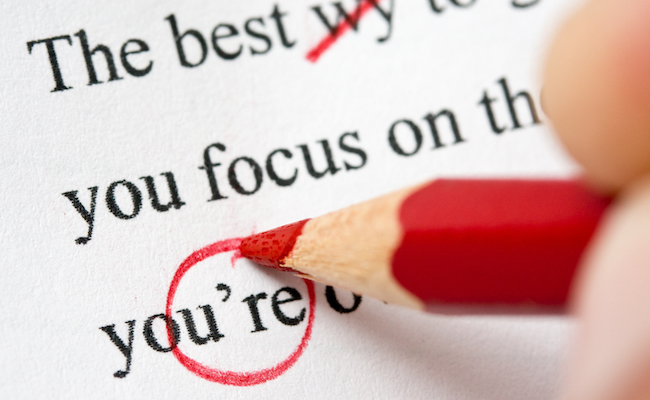
Depending on where you fall on the “correcting other people’s grammar” scale (unless its part of your job), this news will either hit you with euphoria or like a ton of sad bricks that don’t know how to use an Oxford comma (because they’re bricks and therefore not capable of using language in a competent manner): A new study has revealed that those of us who police the grammar of others–guilty! Please join us at the support group meeting–are actually less nice than people who just let things go. Does this mean that you’ll soon need to start forgiving people their “you’re” and “your” mix-ups in the name of being kind? Anecdotal evidence suggests you already should be, but now that actual research is suggesting that it’s problematic, prepare for your life to change in small but significant ways.
The study, which was conducted at The University of Michigan, asked participants to read emails from someone they might potentially live with. According to Mashable, participants were shown emails without errors, emails with only grammatical issues, and emails in which one’s potential roomie just had problems with spelling. Then, participants were asked to judge the person who’d sent their email on what they believed the writer’s social and academic abilities would be. (Of course they were also asked to take a personality test).
All that from a few pieces of written communication? Do we really judge people so harshly? Afraid so:
According to Boland and Queen’s research, more agreeable participants (as determined by the results of the Big Five Personality index) tended to rate grammar errors less harshly than less agreeable participants, who showed more sensitivity to “grammos” — homophonous grammar errors like to/too, it’s/its.
The study, published in the journal PLOS One, then speculates that the difference between the two groups may be “perhaps because less agreeable people are less tolerant of deviations from convention.”
The study also found that those were extroverted were more likely to overlook typos, while those who rated highly on introversion were more likely to gasp in shock at grammar mistakes. That’s not particularly surprising, but still a gentle reminder that some of us might be missing out on making lifelong friends because we can’t forgive someone for not knowing the difference between to, too, and two. And it also means you’re probably going to have to stop responding to texts that suggest that “your the worst” with “whose?” because that’s just going to perpetuate the problem.
As New York University Professor of Linguistics Gregory Guy told Mashable, this field of study is still relatively new, but don’t be surprised if people begin taking more and more of an interest in the ways that we communicate and judge each other in an increasingly text-based world. Especially when the texts and emails we’re getting may be more casual.
Of course, that doesn’t mean that people whose grammar might be a bit rusty can start doing victory laps. While it’d be easy to make a few cheap grammar jokes and write the rest of this sentence layering mistake on top of mistake, it’s also important to note that you should probably still proofread your work, especially if you’re writing to someone on a professional level, because the same people rejecting others based on mistakes in an email looking for roomies will also be in the professional world someday. Wait, does pointing that out make us less nice? Oh god, better call a therapist to help deal with this existential crisis.






